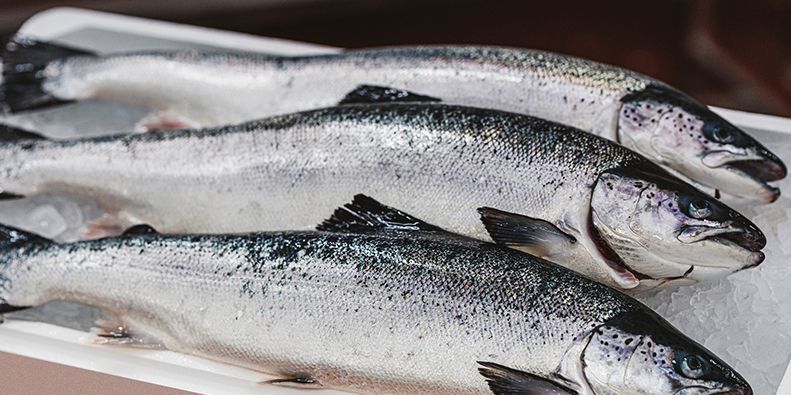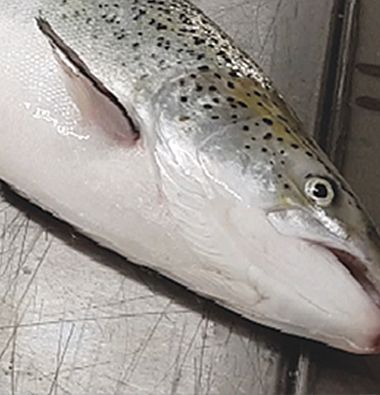Humane harvesting shifts focus to the fish
05 April 2021

There is growing evidence and acceptance that fish are sentient, can detect pain, and are therefore entitled to the same protection as other farmed species. Consumers, retailers and regulators expect high welfare standards of all farmers, not just during production but at the time of slaughter too, and fish are no exception.
Defra (the Department for Environment, Food and Rural Affairs) has said it is bringing in new rules on animal sentience and has recently reviewed the animal welfare legislation that protects animals when they’re slaughtered.
In Scotland’s salmon farming sector, stunning procedures have been adopted as part of the harvesting process for more than 50 years and are independently audited by welfare and product quality schemes.
Around the world, some countries have introduced limited legislation to protect fish welfare at slaughter, according to the Humane Slaughter Association (HSA). In North America, for example, the Canadian Aquaculture Industry Alliance has initiated the development of a Code of Practice for Farmed Salmon to act as a ‘national understanding of animal care requirements and recommended practices’. However, as Dr Huw Golledge of the HSA said:
‘In order to meaningfully protect the welfare of these animals we need more than just legislation, we need to know how to treat them to ensure that they do not suffer.’
Reducing suffering is now the focus of the debate over stunning methods, with retailer Tesco championing the move towards better practice, along with Ace Aquatec. Tesco aquaculture manager Benjamin Weis summed up current thinking in retail on the subject: ‘When it comes to stunning fish there is no wiggle room because fish are either stunned rightly or stunned wrongly.’
The supermarket chain, along with Waitrose, is part of a consortium sponsored by the HSA and led by Ace Aquatec, with Stirling University as partners, to develop, test and validate methods to humanely stun finfish, as well as provide detailed reporting on the economic benefits to farmers from adoption of these novel technologies.
As an award-winning pioneer of in-water electric stunning, Ace Aquatec is well placed to drive up standards in aquaculture sectors that have not, to date, adopted humane slaughter systems.
The HSA project is focusing on inducing immediate unconsciousness in species such as Nile tilapia, pangasius, sea bream and yellowtail kingfish, but Ace Aquatec developed its sector-leading Ace Stunner, over many years of research, for salmonid and trout farmers.
The technology - deployed on salmon and trout farms around the world, from Scotland to Chile to New Zealand - has doubled harvest rates and improved productivity, making farmers’ lives easier.
But its capacity to stun fish in less than one second is what distinguishes the stress-free system from percussive machines that can deliver hit and miss results, particularly with varying sizes of fish.
As Ace Aquatec CEO Nathan Pyne-Carter explains: ‘We pump fish into a pipeline and nothing contacts them apart from the water. There are electrodes that coat the inside of the pipe, producing precisely calibrated voltages, but there are no moving parts in there and nothing touches the fish.
‘As soon as the fish enter that section, 100 per cent are not only immobile, but they are fully unconscious. And because the fish are in water, we don’t need to rely on a bolt hitting a head in the correct place or something touching the fish in the right way. They all get an equal and equally effective stun.’
Welfare issues during slaughtering have encouraged more farmers to rethink their harvesting strategies.
In Chile, trout harvester Abick reports from its trials with an Ace Stunner that fish emerge completely calm. Before, fish sometimes had to be put in the mechanical stunner three times before they stopped moving.
Benjamin Weis said Tesco’s commitment is to have 100 per cent humane slaughter for all its own brand protein products.‘Currently for finfish we allow percussive stunning and electric stunning, and for shrimp it’s ice slurry and electric stunning.
‘Percussive stunning is not always as good as it should be and I think electrical stunning has great potential to be more humane and efficient.’
But he stressed that even the best equipment is useless if it’s not monitored properly, and good management and training are paramount. ‘We need to feel confident that the fish are humanely stunned and that processors know what they’re doing.‘Retailers can only take fish when we can see that they are humanely slaughtered. If not, we have to stop supply immediately.’
Certification has a safeguarding role too, and most retailers insist on third party audits from either ASC, Global GAP or BAP.
Ace Aquatec is now in talks with potential new customers in Scotland and Norway as the ethics of slaughter operations in aquaculture increasingly become centre stage.
‘Harvesting humanely is about consistency,’ said Pyne-Carter. ‘It needs to be more about the fish.’


